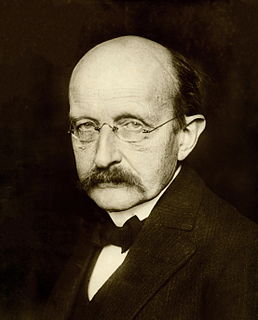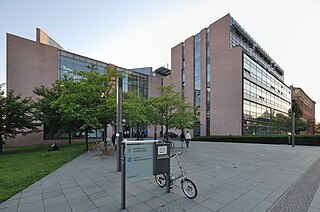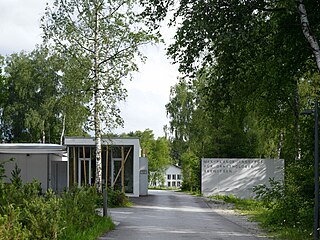
Max Karl Ernst Ludwig Planck, was a German theoretical physicist whose discovery of energy quanta won him the Nobel Prize in Physics in 1918.

The University of Göttingen, officially the Georg August University of Göttingen, is a public research university in the city of Göttingen, Germany. Founded in 1734 by George II, King of Great Britain and Elector of Hanover, and starting classes in 1737, the Georgia Augusta was conceived to promote the ideals of the Enlightenment. It is the oldest university in the state of Lower Saxony and the largest in student enrollment, which stands at around 31,600.

Steglitz-Zehlendorf is the sixth borough of Berlin, formed in Berlin's 2001 administrative reform by merging the former boroughs of Steglitz and Zehlendorf.

Max Theodor Felix von Laue was a German physicist who received the Nobel Prize in Physics in 1914 for his discovery of the diffraction of X-rays by crystals. In addition to his scientific endeavors with contributions in optics, crystallography, quantum theory, superconductivity, and the theory of relativity, he had a number of administrative positions which advanced and guided German scientific research and development during four decades. A strong objector to Nazism, he was instrumental in re-establishing and organizing German science after World War II.

The Max Planck Society for the Advancement of Science is a formally independent non-governmental and non-profit association of German research institutes. Founded in 1911 as the Kaiser Wilhelm Society, it was renamed to the Max Planck Society in 1948 in honor of its former president, theoretical physicist Max Planck. The society is funded by the federal and state governments of Germany.

The Kaiser Wilhelm Society for the Advancement of Science was a German scientific institution established in the German Empire in 1911. Its functions were taken over by the Max Planck Society. The Kaiser Wilhelm Society was an umbrella organisation for many institutes, testing stations, and research units created under its authority.
The Gottfried Wilhelm Leibniz Prize, in short Leibniz Prize, is awarded by the German Research Foundation to "exceptional scientists and academics for their outstanding achievements in the field of research". Since 1986, up to ten prizes are awarded annually to individuals or research groups working at a research institution in Germany or at a German research institution abroad. It is considered the most important research award in Germany.

Peter Gruss is a German developmental biologist, president of the Okinawa Institute of Science and Technology, and the former president of the Max-Planck-Gesellschaft.

The Berlin-Brandenburg capital region is one of the most prolific centers of higher education and research in the world. It is the largest concentration of universities and colleges in Germany. The city has four public research universities and 27 private, professional and technical colleges (Hochschulen), offering a wide range of disciplines. Access to the German university system is tuition free.

Ursula "Ulla" Burchardt is a German politician and member of the SPD.
The Max Planck Institute for Biology was located in Tübingen, Germany. It was created as the Kaiser Wilhelm Institute for Biology in Berlin in 1912, and moved to Tübingen 1943. It was one of 80 institutes in the Max Planck Society and was closed in 2005.

Dahlem is a locality of the Steglitz-Zehlendorf borough in southwestern Berlin. Until Berlin's 2001 administrative reform it was a part of the former borough of Zehlendorf.

The Max Planck Institute for Infection Biology (MPIIB) is a non-university research institute of the Max Planck Society located in the heart of Berlin in Berlin-Mitte. It was founded in 1993. Arturo Zychlinsky is currently the Managing Director. The MPIIB is divided into nine research groups, two partner groups and two Emeritus Groups of the founding director Stefan H. E. Kaufmann and the director emeritus Thomas F. Meyer. The department "Regulation in Infection Biology" headed by 2020 Nobel laureate Emmanuelle Charpentier was hived off as an independent research center in May 2018. The Max Planck Unit for the Science of Pathogens is now administratively independent of the Max Planck Institute for Infection Biology. In October 2019, Igor Iatsenko and Matthieu Domenech de Cellès established their research groups at the institute, Mark Cronan started his position as research group leader in March 2020. Silvia Portugal joined the institute in June 2020 as Lise Meitner Group Leader. Two more research groups where added in 2020, Felix M. Key joined in September and Olivia Majer in October, completing the reorganization of the Max Planck Institute for Infection Biology.
The Max Planck Institute of Molecular Plant Physiology is a German research institute for molecular plant physiology, based in the Golm district of Potsdam, Brandenburg. Founded on 1 January 1994, the MPIMP focuses on the study of the dynamics of plant metabolism and how that relates to the entire plant system. The institution is one of the 80 institutes in the Max Planck Society (Max-Planck-Gesellschaft).

Wolfgang Wickler is a German zoologist, behavioral researcher and author. He led the ethological department of the Max Planck Institute for Behavioral Physiology from 1974, and he took over as director of the institute in 1975. Even after he was given emeritus status, he remained closely associated to the institute in Seewiesen and ensured its smooth transition under the newly created Max Planck Institute for Ornithology.
Heinz A. Staab was a German chemist. From 1990 to 1996 he was Präsident der Max Planck Society.

Jens Beckert is a German sociologist with a strong interest in economic sociology. The author of books on inherited wealth and the social foundations of economic efficiency, he focuses on the role of the economy in society – especially based on studies of markets – as well as organizational sociology, the sociology of inheritance, and sociological theory. He is director at the Max Planck Institute for the Study of Societies (MPIfG) in Cologne, Germany, and a member of the Berlin-Brandenburg Academy of Sciences and Humanities.

The Max Planck Institute for Ornithology is a non-university research institution under the sponsorship of the Max Planck Society for the Advancement of Science (MPG). It is located in Seewiesen, which belongs to the municipality of Pöcking in Upper Bavaria. The institute’s focus lies on basic scientific research in the fields of organismic biology, zoology, ornithology, neurobiology, behavioural ecology, evolutionary biology and evolutionary genetics. The institute is managed on a collegial basis, i.e. one of the two directors of the institute takes over the management for a certain time period. Since January 2020, the managing director is Bart Kempenaers.

The Max Planck Institute for Chemical Physics of Solids is a research institute of the Max Planck Society. Located in Dresden, the institute primarily conducts basic research in the natural sciences in the fields of physics and chemistry.
















